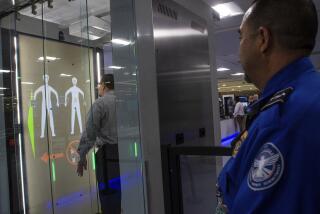Airport security ‘checkpoints of the future’ are proposed
- Share via
Amid furor and frustration over increased airport security measures, a trade group for the world’s airline industry has unveiled a plan that it believes would improve security and speed passengers through checkpoints.
The plan offered by the International Air Travel Assn. would eliminate the “one size fits all” security screening process and instead impose different levels of screening for different types of travelers, with frequent travelers undergoing a less intrusive security search than other passengers.
Under the plan, airport security officers would give extra attention to suspicious travelers instead of focusing on the typical carry-on items all passengers bring aboard, Giovanni Bisignani, director general of the association, said when he unveiled the plan in Geneva last week.
Bisignani envisions an airport of the future where passengers would be directed to one of three tunnels for security screening. Frequent travelers would pass into a tunnel where they would undergo a basic security check.
Infrequent travelers and those who trigger suspicion based on background checks or responses to security questions would be directed to tunnels with increased security measures.
“Developing a checkpoint of the future is at the top of everybody’s agenda,” Bisignani said.
In the U.S., Transportation Security Administration spokesman Nico Melendez said he couldn’t comment specifically on the plan. But he added: “We will continue to work with the international community to identify security solutions.”
• Business travelers expect good Wi-Fi at hotels
This year, a J.D. Power & Associates survey found that free Wi-Fi was the most important amenity for travelers in nearly every segment of the hotel industry, from luxury hotels to budget lodging.
For business travelers, it’s also important that a hotel’s Internet access work well, according to a survey released last week by the mobile Internet company IPass Inc.
The online survey of about 1,200 business travelers from North America, Europe and Asia found that 63% of travelers will check to see if a hotel offers in-room wireless Internet or a wired connection service before booking a room, and 24% assume it will be available without checking.
If Wi-Fi service is poor, most of the business travelers surveyed said, they will tell the front desk clerk or make a complaint on a customer service card.
Poor Wi-Fi access can lead to lost business — 36% of travelers surveyed said it would influence their decision to book again with that particular hotel. Sixteen percent said it would even influence their decision to book with the same hotel chain.
• When and where to get hotel deals
If you are looking to make the most of your travel budget, consider San Diego in January; Florence, Italy, in February; or San Francisco in March.
Those cities were listed among the best hotel values, based on a forecast released last week by the travel website CheapTickets, owned by Orbitz Worldwide.
The website came up with the list by comparing the peak-month prices at three-star hotels in the world’s most popular cities with the prices during their slowest months.
In January, the price of a room at a three-star hotel in San Diego will be down 33% from its peak in July, the forecast said.
In February, you can stay at a three-star hotel in Florence for 51% below the peak prices in October, it said.
And in March, it said, room rates at three-star hotels in San Francisco are about 40% lower than in September.
The biggest price drop is predicted to take place in August in Fort Lauderdale, Fla., with rates down 70% from their February peak.
One drawback, though: August in Fort Lauderdale is hurricane season, and the average temperature is a steamy 83 degrees.
More to Read
Sign up for The Wild
We’ll help you find the best places to hike, bike and run, as well as the perfect silent spots for meditation and yoga.
You may occasionally receive promotional content from the Los Angeles Times.






